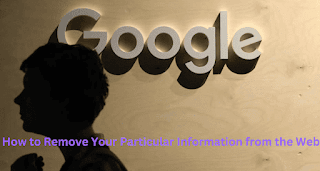How to Remove Your Particular Information from the Web
How to Remove Your Particular Information from the Web

Introduction
The internet is a vast ocean of information, but not all should be readily available. As our lives go online, the quantum of information accessible to the public can be inviting and potentially dangerous. Whether it's for sequestration enterprises, particular safety, or simply wanting a fresh launch, knowing how to remove your particular information from the web is pivotal. This companion will walk you through the way to reclaim your sequestration.
In the moment’s digital age, the web is both a resourceful tool and an implicit trouble to particular sequestration. While it's accessible to have access to a wealth of information at your fingertips, the strike is that your details can fluently become part of that digital geography. With identity theft, cyberstalking, and data breaches getting more common, knowing how to remove your particular information from the web is more important than ever. But how do you do that? Let’s explore the way to take to reclaim your sequestration online.
Why You Might Want to Remove Your Information Sequestration Enterprises
Your particular information being available online can lead to a breach of your sequestration. This might include anything from your home address and phone number to sensitive details like your social security number. Once this information is out there, it can be gruelling to control who accesses it.
Identity Theft Prevention
One of the most significant pitfalls of having your particular information online is identity theft. culprits can use your data to open credit accounts, apply for loans, or indeed commit crimes in your name. Removing your information from the web reduces these pitfalls.
Personal Safety
For some, especially those who have endured stalking or importunity, having particular information online can be a matter of safety. Removing or limiting this information can give peace of mind and a subcaste of protection.
Professional Reputation Management
Your online presence is frequently the first print you give to implicit employers or guests. Outdated or incorrect information can harm your professional character. By drawing up your digital footmark, you can ensure that only the most accurate and positive information is visible.
Understanding the Types of Personal Information Online
Public Records Public records, similar to property records, namer enrollments, and court records, are frequently fluently accessible online. These can include particular details like your full name, address, and more.
Social Media Data
Social media platforms collect and partake in a vast quantum of data. Indeed if your biographies are set to private, some information might still be accessible to the public or through data breaches.
.png)
Hunt Machine Results
Hunt machines like Google and Bing indicate information from each over the web, including particular details. Your name, prints, and other information might appear in hunt results.
Data Broker rosters
Data brokers collect and vend particular information from colourful sources. This data can include everything from your purchasing habits to your contact information. They also vend this information to marketers, companies, or indeed individuals.
Original Way to Take Before Removing Information
Conducting a particular Information inspection Before you start removing information, it's essential to know what is out there. Conduct a thorough inspection of your online presence by searching for your name, dispatch address, and phone number on hunt machines. Note down the websites that display your information.
Prioritizing What Information to Remove
Not all information is inversely sensitive or dangerous. Prioritize removing the most critical and private information first. This might include addresses, phone figures, or anything that could lead to identity theft.
Creating a Plan of Action
Once you've linked what you need to remove, produce a plan. Decide which platforms and websites to attack first, and make a roster of ways to follow. How to Remove Information from Hunt Machines
Requesting URL junking from Google
Google offers a tool for removing specific URLs from their hunt results. However, you can request its junking, If you find a runner that contains your particular information. still, keep in mind that this does not remove the information from the original website it just makes it less visible.
Using Bing's Content junking
Tool Like Google, Bing also offers a content junking tool. Submit a request to have specific URLs removed from their hunt results. This is particularly useful if the information is outdated or inaccurate.
Other Search Machines to Consider
While Google and Bing are the most popular hunt machines, don’t forget about others like Yahoo, DuckDuckGo, and indeed lower indigenous hunt machines. Each may have its process for content junking.
.png)
Removing Personal Information from Social Media
Adjusting sequestration Settings launch by conforming the sequestration settings on your social media accounts. Limit who can see your posts and profile information, and who can find you through hunt machines.
Deleting Old Accounts and Posts
consider deleting them entirely, If you have old social media accounts that you no longer use. For active accounts, go through your post history and cancel any content that contains particular information.
How to communicate Social Media Platforms for Information
Communicate the social media platform directly, If you find that your information has been participated without your concurrence. utmost platforms have a process for reporting and removing unauthorized content.
Opting Out of Data Brokers
What Are Data Brokers? Data brokers are companies that collect and vend particular information. They reference data from public records, social media, and other online conditioning.
How to Find and Conclude- Out of Major
Data Brokers Numerous data brokers give conclude-out options on their websites. Some major bones include Spokeo, Whitepages, and Acxiom. It can be a tedious process, but removing your information from these databases is pivotal.
Exercising Paid Services for Data junking
you can use paid services that specialize in removing information from data brokers If you find the process inviting. These services will handle the conclude-out process on your behalf.
Managing Public Records
What Public Records Are Available Online? Public records can include property power details, court records, marriage licenses, and more. These records are frequently available through government websites or third-party services.
Requesting junking of Public Records
Removing public records can be gruelling, but in some cases, you can request that your information be redacted. This frequently requires reaching the applicable government agency or court.
Legal Options for Removing Public Records
You may need to explore legal options If your request to remove or redact public records is denied. Consult with a counsel who specializes in sequestration law to understand your rights.
Using Online Reputation Management Tools
Overview of Online Reputation Management Services Online character operation services help cover and clean up your online presence. They can help with removing negative or unwanted information and help boost positive content.
DIY Character Management Tips
Start by creating positive content that pushes down unwanted information in hunt results, If you prefer to manage your online presence yourself. This could include blog posts, social media updates, or indeed press releases.
When to Consider Hiring a Professional
Hiring a professional may be worth the investment, If the task seems too inviting or if your particular information has been oppressively compromised. They can offer moxie and tools that aren’t available to the general public.
Staying Anonymous Online
Using Alias and Aliases To cover your identity, consider using aliases or aliases for online biographies. This can help keep your real name off the web while still allowing you to interact online.
Anonymous Browsing Ways
Use tools like VPNs and the Tor cybersurfer to maintain obscurity online. These tools help hide your IP address and cypher your internet exertion. Setting Up Secure Communication Channels When communicating online, use translated messaging apps and secure dispatch providers. This ensures that your exchanges and data are defended from prying eyes.
How to Handle Information
That Won’t Go Down occasionally, no matter how hard you try, certain information remains stubbornly online. In similar cases, you might need to communicate with the website proprietor directly and request junking. continuity is crucial.
Legal Expedient for Stubborn Cases
You may need to explore legal options If a website refuses to remove your information. This could include transferring a check-and-desist letter or pursuing legal action. exercising the Right to Be forsaken( GDPR) still, you can bring the" Right to Be forsaken" under the GDPR, If you’re in the European Union or dealing with an EU- EU-grounded company. This law requires companies to cancel particular information upon request.
Monitoring Your Online Presence
Setting Up Google Alerts Google Alerts is a free tool that lets you cover the web for mentions of your name or other particular information. Set up cautions to be notified whenever your information appears online.
Regularly Checking Hunt Machine Results
Make it a habit to regularly search for your name and other particular information on colourful hunt machines. This helps you stay apprehensive of what’s out there and take action if demanded.
Using Sequestration-Concentrated Tools for Monitoring
There are sequestration-concentrated tools and services designed to help you cover your online presence and cover your data. Consider using these tools for added security. Tips for Keeping Your Information Deposit Box in the Future Best Practices for Participating in Information Online
Be aware of what you partake in online.
Avoid posting sensitive information, and suppose doubly ahead filling out forms or subscribing for services that request particular details. Using Strong Watchwords and Two-Factor Authentication Always use strong, unique watchwords for your online accounts, and enable two-factor authentication whenever possible. This adds a redundant subcaste of security.
Staying Informed About Sequestration Laws and Changes
Sequestration laws are constantly evolving. Stay informed about changes in legislation and how they might impact your online sequestration. This helps you stay ahead of implicit pitfalls.
.png)
Common Miscalculations to Avoid Ignoring Social Media Sequestration
Failing to acclimate your sequestration settings on social media can lead to the unintended sharing of particular information. Make sure to review and modernize your settings regularly.
Overlooking Data Broker rosters
Data brokers are frequently overlooked when it comes to information junking. Make sure to check these services and conclude- out to cover your data.
Neglecting to Cover Your Online Presence
Indeed after removing your information, it’s essential to cover your online presence regularly. This ensures that new information doesn’t slip through the cracks.
Conclusion
guarding your particular information online is an ongoing process, but it's a necessary bone in the moment's digital world. By taking the way outlined in this companion, you can significantly reduce the quantum of particular information available about you on the web. Flashback, it's important to be visionary about your online presence and regularly review what information is out there. Take control of your digital footmark and guard your sequestration.
FAQs
Q1-How Long, Does It Take to Remove Personal Information from the Web?
A- The time it takes to remove particular information can vary depending on the platform and the type of information. Some disposals are immediate, while others may take several weeks.
Q2- Can I Remove My Information from the Internet fully?
A- While it's challenging to remove all traces of your particular information, you can significantly reduce it by following the way in this companion. still, complete junking is frequently not possible due to the nature of the internet.
Q3- What Should I Do If a Website Refuses to Remove My Information?
A- you can escalate the issue by reaching legal professionals or exercising sequestration laws like the GDPR for backing If a website refuses to remove your information.
Q4- Is It Necessary to Hire a Professional for Information junking?
A- Hiring a professional isn't always necessary, but it can be helpful if you are dealing with a large quantum of information or facing difficulties in the junking process.
Q5- How frequently Should I Check for My Information Online?
A- Regularly covering your online presence is crucial to maintaining your sequestration. Set up cautions and check hunt machine results every many months to stay on top of any new information that appears.




.jpg)